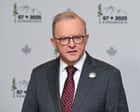WhenAnthony Albanesemet his Canadian counterpart, Mark Carney, in Calgary on Sunday, the Australian leader came with an unusual gift.
Along with an Akubra hat, Albanese presented Carney with framed memorabilia from the 1981 Australian film Gallipoli.Directed by Peter Weir, the war story is a favourite of the former central banker. The gift had been arranged with help from Canberra’s National Film and Sound Archive.
The pair had a friendly and constructive meeting, ahead of the G7 summit getting under way in nearby Kananaskis, in the foothills of the Rocky Mountains, on Tuesday, Australian time. Albanese and Carney will have scores of meetings with leaders from around the world.
But for both, one event is dominating the agenda.Donald Trump, larger than life in any forum he steps into, landed in Canada on Monday afternoon, Australian time.
With protests and civil unrest at home and a growing war in the Middle East, Trump might be forgiven for not spending much time worrying about Albanese. Trump wants Australia to lift its defence spending and will explain the Pentagon’s review of theAukusagreement. But even Australian officials on the ground are describing the talks as introductory and likely uncontroversial.
That probably sounds good to Albanese too. Given the experience of leaders being berated in the Oval Office in recent months, boring may represent a huge success.
Sign up for Guardian Australia’s breaking news email
One option being speculated about is Trump and Albanese holding more substantive talks in Washington DC sometime later in the year, possibly tied to a visit to the UN general assembly. Then Albanese could push for an exemption to Trump’s trade tariffs and build a personal relationship with the mercurial US commander-in-chief.
But whatever happens in the picturesque Kananaskis lodge, Albanese’s gentle foreign policy pivot is playing out at this summit.
Like Carney – who said Canada’s old relationship with the US was “over” – Albanese is strengthening key alliances away from Washington, to build trade and security buffers for an increasingly unreliable ally.
Australia will hold negotiations on joininga defence agreement with the EU, and Albanese has hinted some of his visit, including a stopover in Fiji, was about pushing back on an expansionist China in the Indo-Pacific.
He will meet the leaders of Japan and South Korea while in Canada, as well as the Nato secretary general, Mark Rutte, British prime minister, Keir Starmer, France’s Emmanuel Macron and Germany’s Friedrich Merz.
In those closed-door talks, Albanese will talk about less Trump-friendly issues such as the war in Ukraine, Israel’s continuing humanitarian blockade of Gaza, renewable energy, climate change and free trade ties.
Sign up toBreaking News Australia
Get the most important news as it breaks
after newsletter promotion
Trump’s unorthodox approach to governing will have anxiety levels high around the world for the remainder of his second term. Asked if Australia would “stand shoulder-to-shoulder” in the event China invades Taiwan, or if he would raise such a possibility with Trump, Albanese said on Sunday that he would not pre-empt his discussions.
The pair seem to be off to a good start. Shortly after Albanese was re-elected,Trump praised him, saying they had “a very good relationship” and that Albanese had been nice to him.
Like Carney, Albanese has shown signs of boldness in managing the Trump relationship. He has called the tariffs economically reckless, and angered the US by signing on to sanctions for two hard-right members of Israel’s cabinet last week.
After Carney presented him with a Stetson cowboy hat, the pair agreed the world becoming more dangerous under Trump meant closer ties were needed between Ottawa and Canberra, as evidenced by an official readout from the Canadian side.
“The prime ministers agreed to remain in close contact,” it said.
Tom McIlroy is chief political correspondent for Guardian Australia
